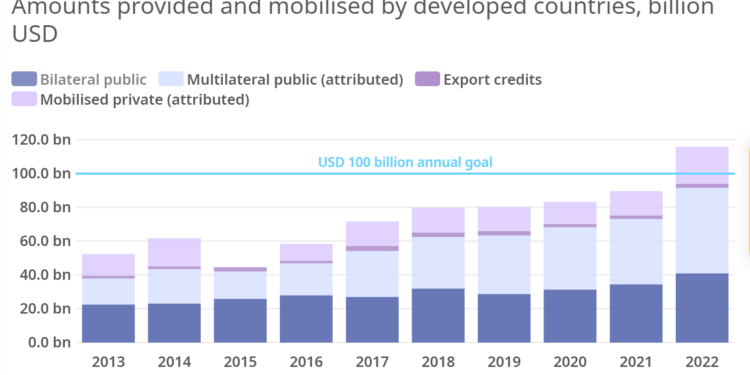Why Private Capital is Indispensable to Close the Great Development and Climate Financing Divide
Almost a decade has passed since countries committed to the 2030 Agenda for Sustainable Development. In 2017, the United Nations first assessed the financing gap – the difference between the estimated financial requirements for achieving the SDGs and the available funding – and estimated that emerging and developing countries would need an additional $2.5 trillion annually to meet the goals.
Unfortunately, nearly 10 years later, the global financial architecture has failed to deliver the needed investments. The financing gap has now evolved into the “great financial divide,” with the shortfall increasing to $4.2 trillion. This shortfall is exacerbated by the growing needs of developing economies, the impact of the COVID-19 pandemic and geopolitical fragmentation.

Image: United Nations/Financing for Sustainable Development Report 2024
Several challenges and market barriers are preventing capital from flowing. The current high interest rate environment, increasing debt levels and rising sovereign spreads exert significant pressure on issuers in developing countries, especially those with sub-investment-grade ratings.
This is also reflected in the higher cost of capital for investors and project developers in emerging countries, where renewable energy projects are estimated to be as much as three times more expensive than in developed countries. This cost disparity is driven mainly by macroeconomic risk factors rather than project-specific risks.
In this era of “permacrisis,” marked by rising systemic risks, worsening global fragmentation and the dramatic onset of climate change, the global financial architecture is failing to realize its full potential.
The sustainable development business case
In a macroeconomic environment characterized by inflationary pressures, public spending is increasingly redirected towards meeting the rapidly rising debt service obligations rather than supporting climate action, the energy transition and broader development goals.
UN Trade and Development found that external public debt service relative to public revenues increased from 5% in 2010 to 8.8% today in developing economies, with a growing number of countries now spending more on interest payments than on development efforts.
Public funds alone can not close the financing divide and support the sustainable development agenda globally. Still, the 2030 agenda presents significant opportunities for greater and more effective private sector involvement.
The adoption of zero-emissions and decarbonization technologies could attract new business and generate sustainable economic growth. Investing in adaptation, resilience and nature solutions could also open the door to innovation and create high-quality jobs, enhancing global competitiveness.
To transform these opportunities into reality, particularly given the shortfall in public funds and insufficient and unfair allocation of climate funds, it is imperative for emerging and developing countries to attract private financiers and investors to mobilize the capital needed for sustainable development projects.
Risk and return will be the deciding factors determining whether a renewable energy, sustainable transportation, water management or regenerative agriculture project can be financed through commercial capital. However, sustainable development opportunities in emerging and developing countries come with risk premiums and additional costs, significantly undermining the projects’ ability to attract private investors and financiers.
Although the mobilization of private capital has increased over recent years and reached an all-time high in 2022 of $21.9 billion, it remains less than 20% of the total funds mobilized.

Image: Organization for Economic Co-operation and Development
During New York Climate Week, the World Economic Forum convened the development community, climate champions, and private and public financiers at the Sustainable Development Impact Meetings to identify ways to mobilize commercial capital further to support the 2030 agenda. Global leaders agreed that action must be prioritized around three impact areas:
1. Increase collaboration across the investment value chain to make sustainable development solutions ‘bankable’
Financing high-risk projects is challenging but not impossible. Each participant in the investment value chain has a distinct role to play: various capital providers, each with different risk profiles, can be strategically combined within a customized capital stack.
De-risking mechanisms provided by multilateral development banks, development finance institutions, and long-term concessional financing instruments can be leveraged to create innovative financing mechanisms that optimize risk allocation, align the risk-return preferences of each investor class, and improve the project’s financial viability.
2. Prioritize opportunities with the highest potential for private-sector engagement
Because public funds are scarce, they must be deployed strategically and prioritized as leverage to catalyze commercial capital participation. This can also be achieved by addressing domestic resource mobilization requirements, incentivizing the participation of local private financiers, deepening local capital markets and attracting international investors.
As a direct contribution to this year’s G20 Energy Transition Working Group, the World Economic Forum’s Mobilizing Investment for Clean Energy in Emerging Economies Network launched the “Playbook of Solutions” at the Clean Energy Ministerial (CEM15). The Playbook references over 100 policy measures, finance mechanisms and de-risking solutions that have successfully encouraged private sector participation in unlocking capital for clean energy in emerging markets and developing economies.
3. Create an enabling environment for investments through strategic reforms
Commercial capital will be attracted more easily to economies with a strong vision and clear strategy for achieving the SDGs. Egypt’s Nexus of Water, Food and Energy programme, for example, is set to attract funds and investments for green projects in these critical sectors.
The country realized the importance of prioritizing the creation of a solid project pipeline worth $14.7 billion. It deployed government and concessional financing to unlock vast opportunities for private-sector engagement. This model could be replicable in other economies.
Financing for development 2025
At New York Climate Week the call to action was evident. With just five years left to achieve the SDGs, the UN is focused on identifying innovative ways to mobilize private capital in support of the sustainable development agenda.
The Fourth International Conference on Financing for Development next year will serve as a key milestone for the global community to take stock of the progress made, explore how to modernize the international financial architecture to ensure emerging and developing economies can attract the necessary finance and craft a new pathway for cross-industry collaboration across the investment value chain.







